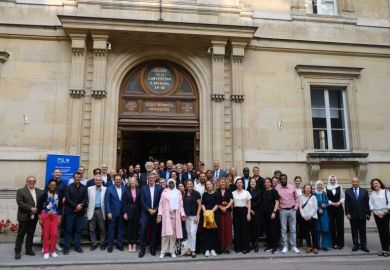A world dominated by the legacies of colonialism, deindustrialisation, globalisation and climate change will require higher education to “rapidly pivot towards programmes of adult and community-based education oriented towards social learning and social innovation”, according to a professor of educational and social futures.
Keri Facer, of the University of Bristol, told the Centre for Global Higher Education conference that for many people “the apocalypse has already happened”, in the “forms of colonialism, deindustrialisation and globalisation”, while for others “the reality is beginning to sink in that we have a 50/50 chance of reaching 1.5 degrees [increase in global temperatures] in the next five years, with all its implications for our children’s and other people’s children’s lives”.
“Under these conditions there is a need for a form of imagination that is relational – oriented towards tuning into and engaging with other people’s views and experiences – critical – able to ask hard questions about how we got here to avoid getting stuck in the same old patterns of thought – and experimental – able to open up with creativity and care to practices of remaking our world in different forms,” she said.
“If universities are to support the development of such a rich imagination, we need to reckon with our own pasts, get our own house in order, reconfigure ourselves as sites of hospitality to very different views, and settle in for the long-term partnership working.”
Making recommendations for change, she focused on the UK context as “the one I know best”.
“First, the higher education sector as a whole needs to rapidly pivot towards programmes of adult and community-based education oriented towards social learning and social innovation,” Professor Facer said. “These programmes need to create interdisciplinary and transdisciplinary collaborative research-based learning communities.
“They should be open to everyone from those in carbon-intensive industries seeking new jobs, to those without work seeking to create sustainable livelihoods, to those with positions of influence in wider society looking to shift whole sectors to other ways of working.”
Second, she continued, “governments need to redefine how they allocate infrastructure funding, recognising that for the practice of the social imagination, it is time, people, relationships and the everyday small interactions from food to bus tickets that constitute infrastructural investments. We need to see five-, 10-, 20-year investments in collaborative, community-based partnerships that allow the building of trust, the tackling of hard questions and sustained collaborations around the problems of living.”
Fundamental change “in how we live within the next five to 10 years” will mean universities “have to be at the heart of that process, not as saviours but as imperfect, compromised, entangled institutions of modernity who are nonetheless willing to reflect and learn and experiment with the new roles that they might play”, said Professor Facer.
Register to continue
Why register?
- Registration is free and only takes a moment
- Once registered, you can read 3 articles a month
- Sign up for our newsletter
Subscribe
Or subscribe for unlimited access to:
- Unlimited access to news, views, insights & reviews
- Digital editions
- Digital access to THE’s university and college rankings analysis
Already registered or a current subscriber?










